Do you want to know, “How is Udacity Data Analyst Nanodegree?“… If yes, then this article will clear your doubts. In this article, you will get to know all details regarding Udacity Data Analyst Nanodegree. Now without any further ado, let’s start the Udacity Data Analyst Nanodegree Review.
How is Udacity Data Analyst Nanodegree?
- Review Summary for Udacity Data Analyst Nanodegree Program – My Learning Experience
- How were the Content & Projects of the Udacity Data Analyst Nanodegree?
- How Much Time and Money do You have to Spend on Udacity Data Analyst Nanodegree?
- How to Complete the Udacity Data Analyst Nanodegree program in Less Amount?
- Who Should Enroll in the Udacity Data Analyst Nanodegree?
- Were Instructors Experienced?
- What did I like about the Udacity Data Analyst Nanodegree program?/Pros
- What I didn't like about Udacity Data Analyst Nanodegree?/Drawbacks
- Is Udacity Data Analyst Nanodegree Worth It?"
- Alternatives for Beginners
- Alternative for Beginners who want to use Python
- Comparison of Udacity Data Analyst and Google Data Analytics Certification
In this article, I will share what I have learned throughout this Udacity Data Analyst Nanodegree Program and what I liked and didn’t like about the program.
Before starting the detailed review, first, I would like to summarize a Udacity Data Analyst Nanodegree Review.
Review Summary for Udacity Data Analyst Nanodegree Program – My Learning Experience
| Aspect | Rating (Out of 5) | Comments |
|---|---|---|
| Course Content | 4.5 | The Udacity Data Analyst Nanodegree Program offered a comprehensive curriculum that covered essential data analysis topics. It provided me with a solid foundation and practical skills relevant to the field. However, I would have appreciated more in-depth coverage of advanced concepts. |
| Teaching Quality | 4.0 | The instructors were knowledgeable and presented the material effectively. However, I felt that the lack of live interaction and personalized feedback impacted my learning experience to some extent. |
| Learning Resources | 4.5 | Udacity provided high-quality resources, including video lectures, quizzes, and interactive projects. These resources were helpful in reinforcing the course material. However, I would have liked to see more diverse learning resources and supplemental materials. |
| Projects | 4.0 | The projects in the program were practical and allowed me to apply my skills effectively. However, I found some assessments to be challenging, and I desired more detailed feedback to understand my areas of improvement better. |
| Classroom Environment | 4.0 | The online learning environment was flexible and convenient for self-paced learning. However, I felt that the limited interaction and the absence of collaborative work with peers affected the sense of community and engagement in the program. |
| Grading and Feedback | 4.0 | The grading process was fair and feedback was provided in a timely manner. However, I wished for more personalized and in-depth feedback on my assignments to further enhance my learning experience. |
| Career Relevance | 4.5 | The program focused on practical applications and provided valuable insights into industry best practices. However, I would have appreciated more specific career-oriented guidance and resources. |
| Overall Experience | 4.0 | My overall experience with the Udacity Data Analyst Nanodegree Program was positive. The curriculum and resources provided a solid learning foundation. However, improvements could be made in terms of interactivity, personalized feedback, and career guidance to further enhance the program. |
Check 60% off Discount-> Udacity Data Analyst Nanodegree Program [Use the code BACK2SKILLS]
Now, let’s see the Content and Projects covered in Udacity Data Analyst Nanodegree Program.
How were the Content & Projects of the Udacity Data Analyst Nanodegree?
Udacity Data Analyst Nanodegree Program had more projects than courses. I found that Udacity Data Analyst Nanodegree is more practical in nature compared to other Data Analytics courses.
The first course had 2 projects and the rest of the courses had 1 project. After learning the concepts, we had to work on a project to test out understanding.
Most courses cover only the theoretical part and don’t cover hands-on practices but Udacity Data Analyst Nanodegree Program was different.
This Nanodegree Program was the perfect balance of theory and hands-on practices.
Udacity also provided us with a Mentor. I never found this feature on any other platform. The mentor guided me throughout the program whenever I had some doubts.
These were the 4 courses-
- Introduction to Data Analysis
- Practical Statistics
- Data Wrangling
- Data Visualization with Python
Now let’s see what I have learned in these courses-
Course 1. Introduction to Data Analysis
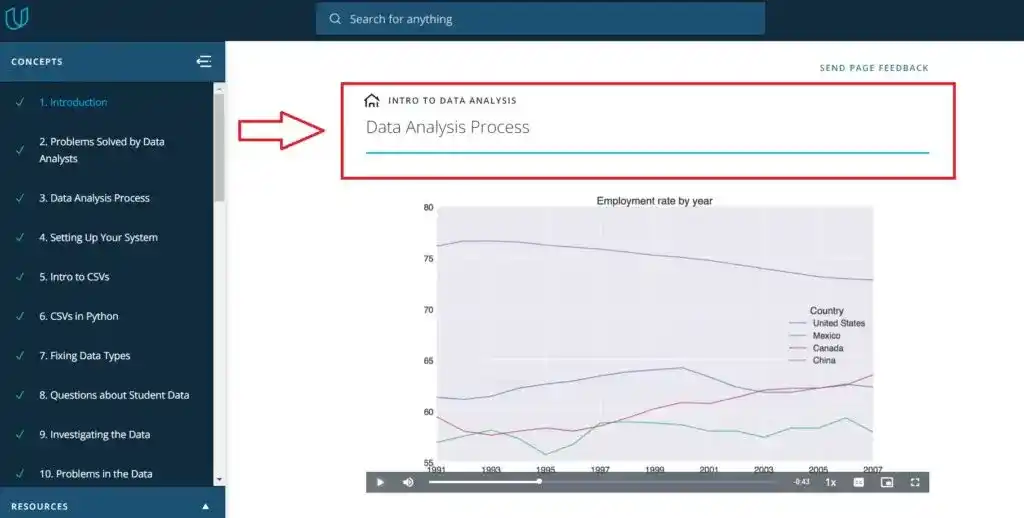
This was the first course in this Nanodegree Program. It was an introductory course, where the instructor introduced me to working with an Anaconda and Jupyter Notebook.
I also learned the two popular libraries of Python– Pandas and Numpy.
To understand this course, Python knowledge is required. I already knew Python Programming that’s why I found this course easy. But if someone doesn’t know Python, I would suggest then learning Python first.
You can learn Python from YouTube tutorials. There is a lot of Free material available for learning Python.
After learning the process of data analysis, there were two projects in this course.
Project 1- Explore Weather Trends
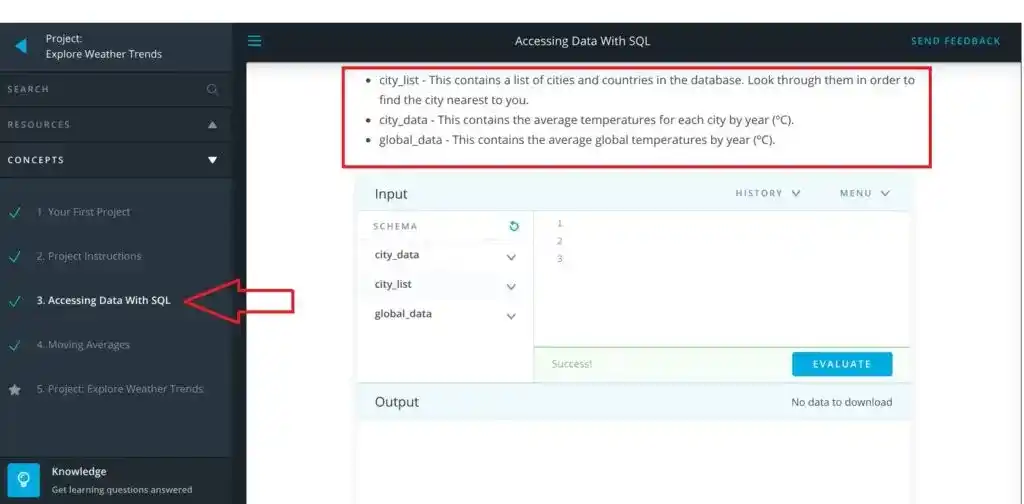
This was the first project of this course. In this project, I had to analyze the temperature locally and globally and then I had to compare these temperatures to the city I live with global temperature.
For this project, I had to extract the data from the database available in the Udacity portal by using SQL.
For this project, previous knowledge of SQL and Excel is required. Otherwise, It will be hard to finish this project. I already knew SQL and Excel, that’s why I found this project easy.
The project submission was in the PDF. After submitting the project, the reviewer from Udacity checked the project and approved it. The reviewer also gave me some suggestions and feedback on my project.
Once I completed this project, there was another project in the same course.
Check 60% off Discount-> Udacity Data Analyst Nanodegree Program [Use the code BACK2SKILLS]
Project 2- Investigate a Dataset
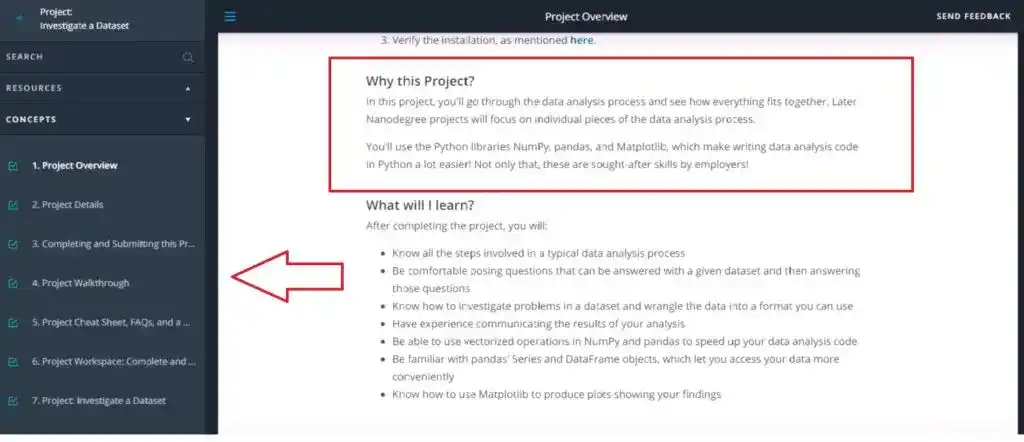
In this second project, I had to analyze a dataset and communicate our findings about it. For this project, I used Numpy, Pandas, and Matplotlib.
This was the list provided by Udacity for choosing a dataset. I had to choose a dataset from this list only. The project submission was only in PDF or HTML files.
This was a little tough project compared to the previous one. But this is quite obvious.
Once I completed this project, I moved to the next course.
Course 2. Practical Statistics
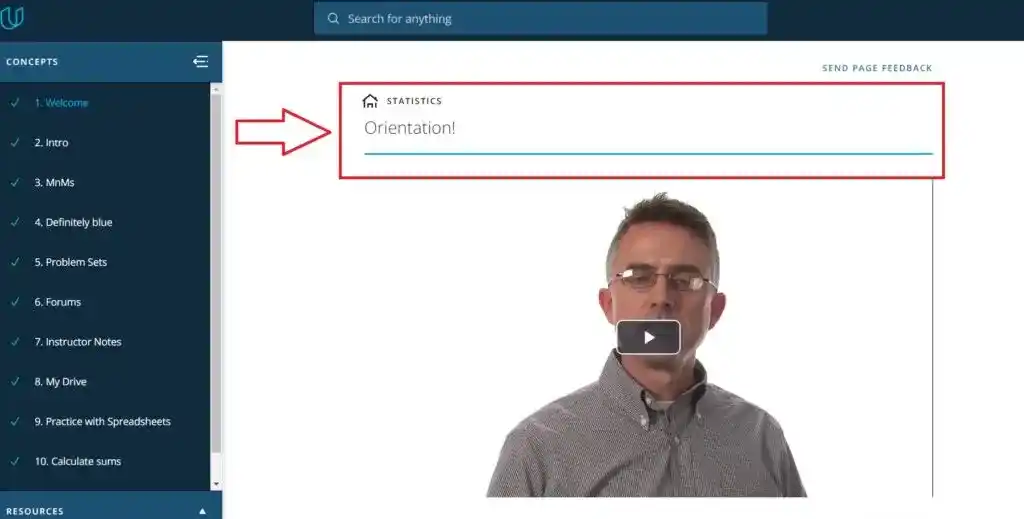
This course was all about statistics. Statistical knowledge is essential in data analysis. I found this course the lengthiest and most math-heavy course in the Nanodegree program. In this course, there were 13 lessons.
This course covered all the essential topics of statistics required for Data Analysis such as Simpson’s Paradox, Probability, binomial distribution, conditional probability, Bayes theorem, Standardizing, Hypothesis Testing, T-Tests, and A/B Tests, and Regression(multiple linear regression & logistic regression).
I found this course the toughest course because my domain is different and I had no previous knowledge of statistics. That’s why digesting these complex statistics topics was hard for me.
I watched the course material two times to understand the concepts. If you are a non-statistics person, I would suggest watching some tutorials on statistics before starting this course.
There was one project in this course- Analyze Experiment Results.
Project 3- Analyze Experiment Results
This was the third project of this Nanodegree Program. The objective of this project was to analyze A/B Test Results.
A/B Test Results are the tests that are performed by data analysts and data scientists on a day-to-day basis.
There was an e-commerce company and I had to understand the results of an A/B test for this company. The whole project was divided into three parts- Probability, A/B Test, and Regression.
For me, it was a very difficult project. And I resubmitted the project 2 times. But, thankfully somehow I completed this project and moved to the next course.
Check 60% off Discount-> Udacity Data Analyst Nanodegree Program [Use the code BACK2SKILLS]
Now let’s see the details of the third course-
Course 3. Data Wrangling
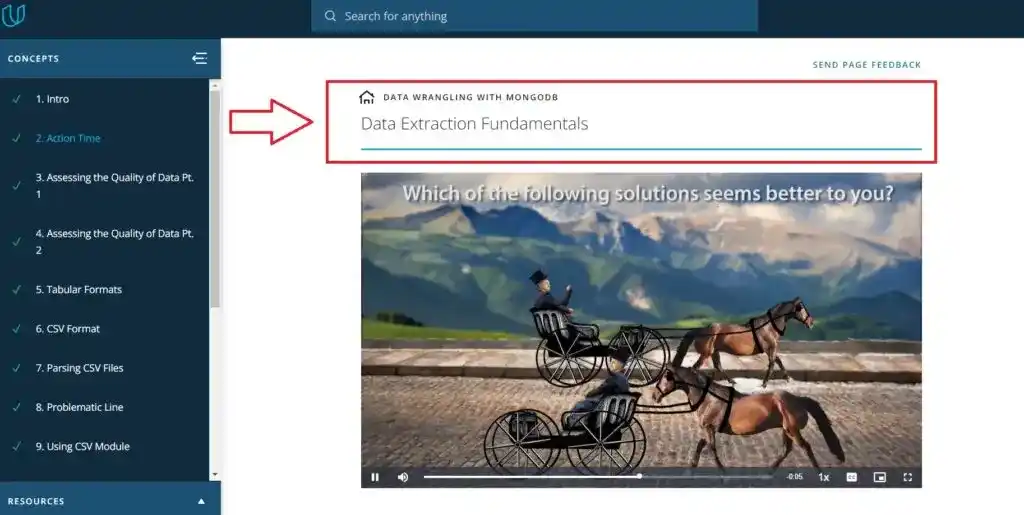
This was a short course with 4 lessons, but this course covers the essential part of data analysis which is Data Wrangling.
Data Wrangling is the process of making the data more ready to use. The data we collected is not clean. By applying Data Wrangling, we convert raw data into more accurate data.
This was a fun course for me. In this course, the instructor taught us all the steps involved in Data Wrangling.
First, we downloaded the dirty dataset from various sources, and then categorize this data into various metrics. After that, we performed Data Cleaning using Python and pandas.
For me, this was the most helpful course. Because I was working on “Depression Detection using Social Media Data”. And the data, I collected was not clean.
But after completing this course, I had a clear vision of what I had to do with my research project. Thanks to Udacity instructors.
In this course, there was one project- Wrangle and Analyze Data.
Project 4- Wrangle and Analyze Data
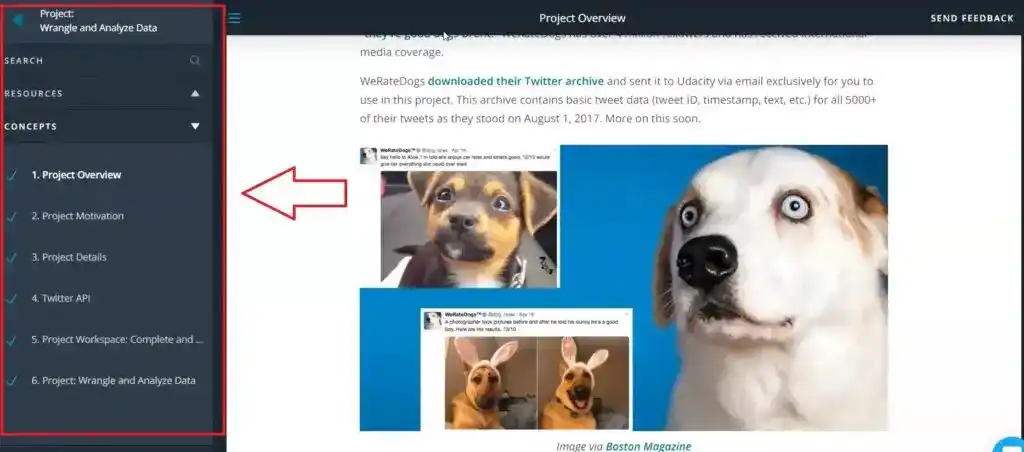
This was a fun and challenging project. And this project was the most practical and good for resumes.
For this project, I had to use the tweet archive of Twitter user @dog_rates, also known as WeRateDogs. There are 6 million followers of WeRateDogs.
WeRateDogs downloaded their Twitter archive and sent it to Udacity via email exclusively to use in this project.
For this project, the following packages/libraries were used-
- pandas
- NumPy
- requests
- tweepy
- JSON
Check 60% off Discount-> Udacity Data Analyst Nanodegree Program [Use the code BACK2SKILLS]
Overall, I enjoyed and learned from this project. And this project will help me in my future research work. After this project, there was the fourth and last course of this Nanodegree.
Throughout this project, you will learn various things which will solidify your data-wrangling understanding. Now let’s see the last course of the Nanodegree program–
Course 4. Data Visualization with Python
This was the last course of this Nanodegree program. In this course, I learned how to perform Data Visualization with Python.
Data Visualization is an essential step in Data Analysis. Throughout this course, I learned Data Visualization in detail.
The instructor of this course was very helpful and explained each concept in an easy manner. I learned Univariate Exploration and Bivariate Exploration of data.
The instructor also taught us about bar charts, histograms, scatterplots, clustered bar charts, and violin and bar charts. And he also explained how to tell a compelling story with data.
I enjoyed this course and learned useful concepts of Data Visualization.
After this course, there was the last project.
Project 5- Communicate Data Findings
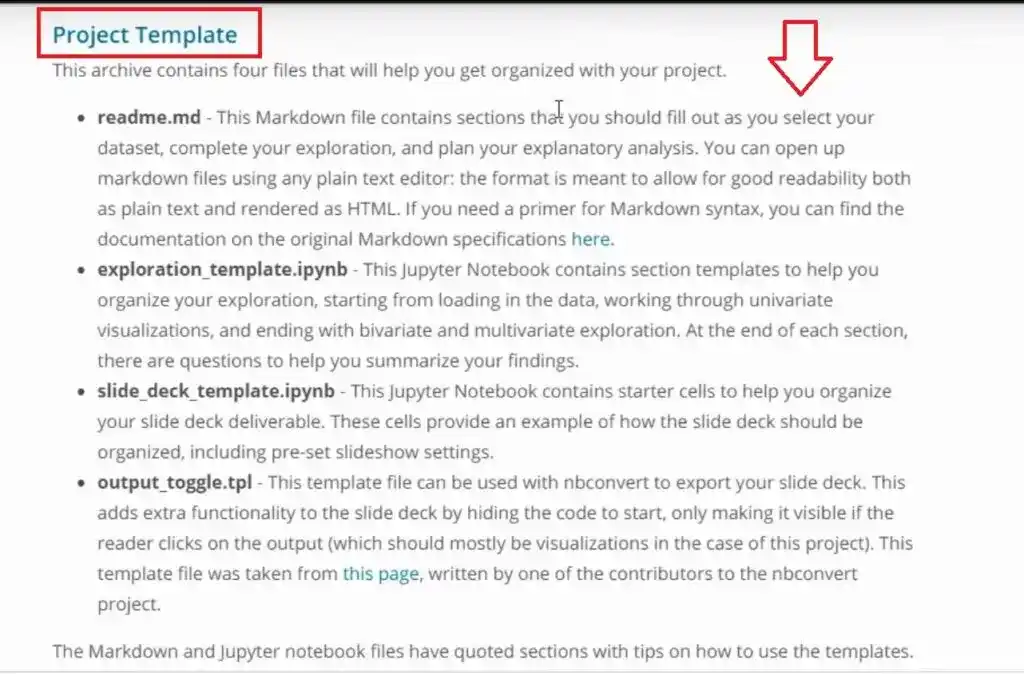
This was the last project. This project was divided into two parts.
In the first part of the project, I had to perform an exploratory data analysis on a dataset of my choice. And I had to use Python data visualization libraries.
In the second part, I had to create a short presentation that illustrates interesting properties, trends, and relationships of my findings.
Udacity provided us with some dataset options. These options were-
- Ford GoBike System Data
- Flights
- Loan Data from Prosper with Prosper Data Dictionary to Explain Dataset’s Variables
- PISA Data with PISA Data Dictionary to Explain Dataset’s Variables
Before submitting the project, I would recommend everyone read the project rubric thoroughly.
So, this is all about the course content and project covered in the Udacity Data Analyst Nanodegree program.
If you ask me to judge the Udacity Data Analyst Nanodegree program on the basis of projects and content, I would say the Udacity Data Analyst Nanodegree program is worth it.
Now, let’s see some other essential things related to the Udacity Data Analyst Nanodegree program.
Now, let’s see the price and duration of the Udacity Data Analyst Nanodegree program
How Much Time and Money do You have to Spend on Udacity Data Analyst Nanodegree?
According to Udacity, the Udacity Data Analyst Nanodegree program will take 4 months to complete if you spend 10 hours per week.
Udacity All Access lets you learn whenever and however you want. Whether you want to become an expert or just want to explore new things, you can do it. And don’t worry about breaking the bank; they want to make sure learning is affordable for everyone. Plus, they’re serious about keeping the quality top-notch.
Now, let’s talk numbers. How much does this Udacity All Access pass cost?
- It’s $249 per month.
- Or, if you go for the yearly plan, you get a 20% discount, making it $2,390 for the whole year.
And here’s the cherry on top – you can try it for a week with no risk at all. They might even have special deals for you!
Udacity
I know Udacity Data Analyst Nanodegree is expensive compared to other MOOCs. That’s why I would like to share some methods to save some money.
Check 60% off Discount-> Udacity Data Analyst Nanodegree Program [Use the code BACK2SKILLS]
How to Complete the Udacity Data Analyst Nanodegree program in Less Amount?
Most of the time, Udacity offers some discounts. When they offer a discount, it appears something like that-
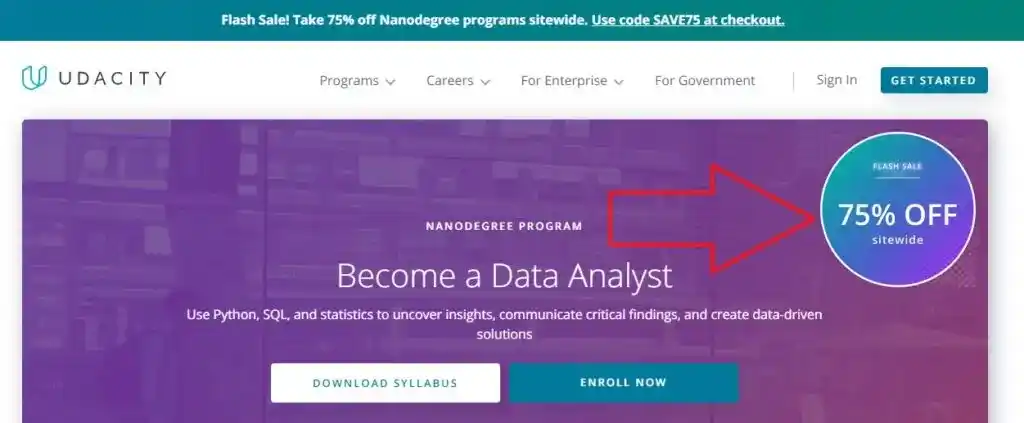
You need to apply the coupon provided by Udacity at the time of checkout. And you will get a discount on the Udacity Data Analyst Nanodegree program. So to get a discount on Udacity, you need to wait for their sale.
You can check the current Discount of Udacity here.
Another thing you can do to save some money is-
Complete the whole Nanodegree in less time
To complete the Udacity Data Analyst Nanodegree program in less time, you need to manage your time productively.
You need to plan your day before and create a to-do list for each day. And you need to spend a good amount of time daily on the program.
According to Udacity, you need to spend 10 hours per week to complete the whole program in 4 months.
Right…?
That means, daily you need to spend 1.5 hours, but if you double the time and give daily 3 hours, then you can complete the whole Nanodegree program in 2 months.
For managing your time and avoiding any distractions, you can use the Pomodoro technique to increase your learning.
And you can also implement the project phases after watching the related lecture. By doing this way, you can save your time by watching one video two times. One at the time of learning and the second at the time of working on the project.
I hope these tips will help you to complete the Udacity Data Analyst Nanodegree Program in less time. And you can save two months’ fees.
Udacity Data Analyst Nanodegree needs some prerequisites and without having prerequisite knowledge, you will not get 100% from this Nanodegree, and it will be a waste of money. So, let’s see the prerequisites for Udacity Data Analyst Nanodegree–
Who Should Enroll in the Udacity Data Analyst Nanodegree?
Those who have prior knowledge of the following topics-
Python & SQL
If you are a beginner in Python, then don’t directly jump to this program. To succeed in the Udacity Data Analyst Nanodegree program, you should have working experience with data in Python (specifically NumPy and Pandas) and SQL.
If you meet the following prerequisites, then you can enroll in the Udacity Data Analyst Nanodegree program. If not, then first, you should learn Python and SQL.
Check 60% off Discount-> Udacity Data Analyst Nanodegree Program [Use the code BACK2SKILLS]
The next thing you need to know about this Nanodegree is the Instructors. Let’s see about the Instructors-
Were Instructors Experienced?
- Josh Bernhard – Data Scientist at Nerd Wallet
- Sebastian Thrun– The founder and president of Udacity. He is also a founder of Google X.
- Derek Steer- CEO of Mode Analytics
- Juno Lee – Data Scientist and expert in building a recommendation engine
- Mike Yi –Data Analyst Instructor
- David Venturi- Former Chemical Engineer and Data Analyst.
- Sam Nelson– Product Lead for Udacity’s Data Analyst, Business Analyst, and Data Foundations programs.
All the instructors were experienced and knowledgeable. And learning from such instructors was amazing and helpful. That is the reason I love Udacity.
Now, I would like to share what did I like about the Udacity Data Analyst Nanodegree Program and what I didn’t like.
What did I like about the Udacity Data Analyst Nanodegree program?/Pros
1. Covered Statistics Concepts in Details
This Udacity Data Analyst Nanodegree Program covered statistical concepts in detail. Along with the concepts, there was one project related to statistics.
2. Data Wrangling & Visualization concepts were cleared
In this Nanodegree program, the concepts of Data wrangling and visualization were cleared with the help of projects and quizzes.
3. Their Technical Mentor Support was Amazing
I never found this feature on other platforms. Their technical mentor support helped a lot whenever I got stuck in the program. The mentor guided me.
4. Focused on Hands-On Practices
Unlike other courses, this Udacity Data Analyst Nanodegree program focused on hands-on practices and covered 5 projects. These projects helped to clear the concepts.
5. The Reviewer gave personal feedback
After completing each project, we had to submit the project for review and the reviewer from Udacity checked the project and gave feedback on the project. This was a very helpful feature of Udacity.
6. Didn’t Provide Spoon-Feeding type Teaching
Udacity provided us with a Reviewer and Technical mentor support but we had to find and work on projects by ourselves.
7. Great Community for Help
Udacity provides a community for help. They have a Stackoverflow-style Q&A forum for people who are stuck with assignments.
8. Extracurricular Material
Udacity provided tutorials on Python and SQL for those who don’t have previous knowledge of Python and SQL.
What I didn’t like about Udacity Data Analyst Nanodegree?/Drawbacks
1. Expensive
The Udacity Data Analyst Nanodegree is very expensive as compared to other platform courses.
2. Big Data Topic was not Covered
The Big Data topic was missing in this Nanodegree program.
3. No IOS and Android Apps
Udacity doesn’t have any IOS and android apps. That’s why I found it difficult to study on my smartphone.
So after analyzing everything about the Udacity Data Analyst Nanodegree program, it’s time to answer this question- “Is Udacity Data Analyst Nanodegree Worth It?”
Is Udacity Data Analyst Nanodegree Worth It?”
Yes, it is worth it for those who knew Python and SQL and want to advance their skills in Data Analysis. Their content is advanced and updated. The whole Nanodegree program is combined with various Real-World projects that will make your resume powerful. They will also provide One-to-One Mentorship to clear your doubts while working on projects. But Udacity Data Analyst Nanodegree is not worth it for beginners.
Check 60% off Discount-> Udacity Data Analyst Nanodegree Program [Use the code BACK2SKILLS]
Alternatives for Beginners
If you are a beginner in Data Analysis, I would recommend Google Data Analytics Professional Certificate Program. In this program, you will learn the most popular tool, Tableau, for data visualization. But this program uses R Programming language instead of Python.
Alternative for Beginners who want to use Python
If you don’t want to learn R Programming, you can go with IBM Data Analyst. This is the perfect program for novices to gain hands-on skills and practice.
Comparison of Udacity Data Analyst and Google Data Analytics Certification
| Udacity Data Analyst Nanodegree Program | Google Data Analytics Professional Certificate | |
| Rating- | 4.6/5 | 4.8/5 |
| Price- | $399/month | $39/month |
| Time to Complete- | 4 months | ≈ 260 hours 6 months (10 hours/week) |
| Programming language– | Python Programming | R Programming |
| Visualization tool– | Python | Tableau |
| Spreadsheets- | Excel | Google Sheets |
| Number of Courses- | 4 | 8 |
| Instructors- | Professionals from Top Companies across the Globe. | Data Scientists from Google. |
| Suitable for- | Intermediate | Beginner |
| Check Udacity Data Analyst Nanodegree | Check Google Data Analytics Professional Certificate |
Conclusion
I hope this Udacity Data Analyst Nanodegree Review helped you and cleared your doubts regarding the Udacity Data Analyst Nanodegree program. If you have any doubts or questions, feel free to ask me in the comment section.
All the Best!
FAQ
You May Also Be Interested In
Data Analyst Online Certification to Become a Successful Data Analyst
Google Data Analytics Certification vs IBM Data Analyst- Which is Better?
IBM Data Science vs IBM Data Analyst- Which One is Better for you?
8 Best Books on Data Science with Python You Must Read in 2025
14 Best+Free Data Science with Python Courses Online- [Bestseller 2025]
10 Best Online Courses for Machine Learning with Python in 2025
10 Best Online Courses for Data Science with R Programming in 2025
8 Best Data Engineering Courses Online- Complete List of Resources
Best Course on Statistics for Data Science to Master in Statistics
8 Best Tableau Courses Online– Find the Best One For You!
8 Best Online Courses on Big Data Analytics You Need to Know
Best SQL Online Course Certificate Programs for Data Science
7 Best SAS Certification Online Courses You Need to Know
Thank YOU!
Explore More about Data Science, Visit Here
Though of the Day…
‘ It’s what you learn after you know it all that counts.’
– John Wooden
Written By Aqsa Zafar
Founder of MLTUT, Machine Learning Ph.D. scholar at Dayananda Sagar University. Research on social media depression detection. Create tutorials on ML and data science for diverse applications. Passionate about sharing knowledge through website and social media.

